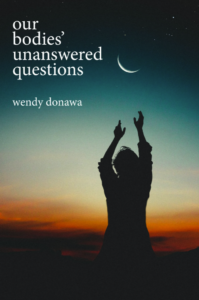By Angeline Schellenberg
Our Bodies’ Unanswered Questions
by Wendy Donawa
Frontenac House Poetry (2021)
“Is it bravado or just cheap grace, / hoping anything can be borne / if sung or placarded or crafted to a poem?” (84), asks Wendy Donawa in her second poetry collection, Our Bodies’ Unanswered Questions—a visceral, at times playful, coming to grips with personal pain and communal grief.
The first section’s swirling clouds, snowflakes, birds, and poets symbolize the progression within the book’s three sections: spiraling outward from what we sense in our bodies beginning in childhood, to the losses that baffle the mind, to the heart’s cry against global injustice.
The first section, “The Most Sensitive Skin in the Animal World,” artfully juxtaposes the profane with the holy, in lines about a “mother’s smile / both eros and caritas, an apotheosis” (15) and a father’s declaration, “we’re holy and hungry” (19).
Donawa uses repetition to great effect, both in her choice of form (cento, palindrome, pantoums) and in her images. Body parts reappear, turning like a jewel to flash here the depravity, here the glory. A devastating piece about a man groping a child’s bum at church (19) is followed by an ode to “the marvel of hands, even mine” (20). The intimacy of this section makes it the book’s most affecting.
The middle section, “All Gathers to Riddle Us,” draws on Asian culture (the Zen garden in Kyoto, a Chinese poet, kintsugi art), Greek mythology, and greeting cards, as well as the absurdity of “sad seniors in Santa hats” (48), to explore the mysteries of time, memory, and grief.
The juxtaposition of the everyday and the momentous continues, evident in the poem about buying a marriage licence at London Drugs, among those “returning defunct electric toothbrushes and past-best yoghurt specials / …. between the Lotto and the Nicorettes” (58).
Some of this year’s best pandemic poems are Donawa’s “Journal of the Plague Year” pieces with their pulsing anxieties under “Covid’s piñata of death” (70), with people “astonished by childhood liturgies / … muttering preserve us” (71).
The final division, “The Heart in its Boney Cage,” calls down blessings on Syrian refugees and “those ‘aged-out’ of what the world calls care” (85).
Critiques of U.S. policy favour cleverness over lyric; the tone of names like “Trumperer” and “Trumpident” (88–89) feel out of step with her dire comparisons between Trump’s caged migrant children and Herod’s slaughter of Bethlehem’s babies.
“We all try to change what we fear into something beautiful” (28), says Donawa. From the horror of a missing brother to the overwhelming refugee crisis, in Our Bodies’ Unanswered Questions, the poet succeeds.
Angeline Schellenberg is the author of the Manitoba Book Award winner Tell Them It Was Mozart (Brick Books, 2016), four poetry chapbooks, and the KOBZAR Book Award finalist Fields of Light and Stone (University of Alberta Press, 2020). Her microfiction has appeared recently in Grey Sparrow Journal, SoFloPoJo, and Exposition Review. Angeline hosts Speaking Crow, Winnipeg’s longest-running poetry open mic. She is training as an Ignatian spiritual director.

